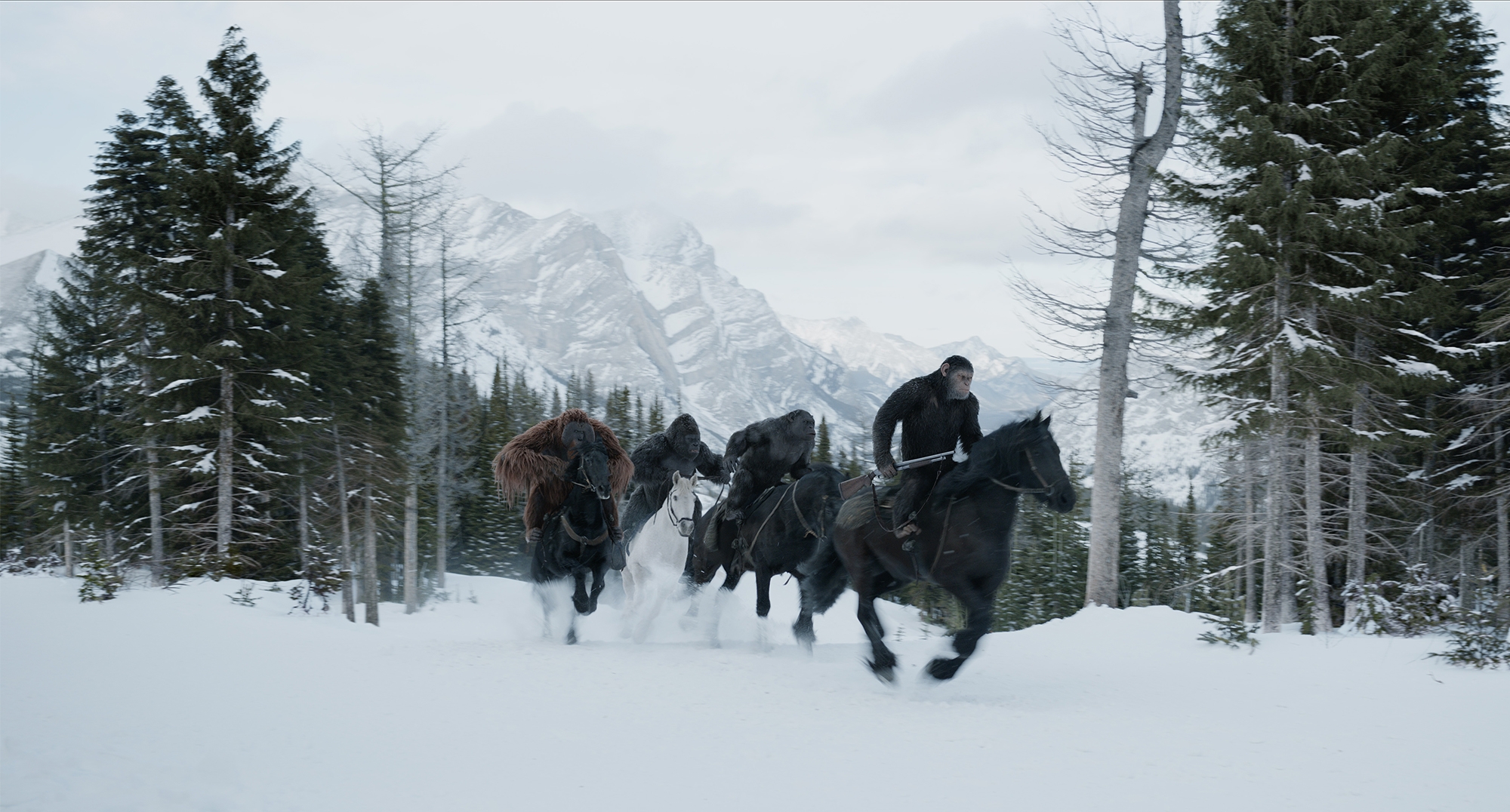War for the Planet of the Apes, the third in a recent trilogy of Planet of the Apes prequels, is a film for and about our time. It has a lot on its mind—some of it coherently expressed, much of it fragmentary and piecemeal. It’s also a dark film, alternately somber and seething with anger. Every character feels oppressed, beleaguered, at war on some front or another. In many ways, the film’s emotional register is like Twitter’s: funny at times, often retributive, and mostly just bleak.
Like a social media feed, which sends readers in multiple directions at once and has a knack for confirming or denying what one wants to confirm or deny, War is a political film that can be interpreted in countless ways. Is it a commentary on immigration? A critique of contemporary American politics? A philosophical rumination on what it means to be human? A biblical epic inspired by Exodus? Yes. Evidence can be marshalled to support any of these takes, and doubtless many others.
This is part of what I mean when I say War is a film for and about our time. The choose-your-own-grievance nature of the internet has led us to see everything through subjective lenses of politics, identity, and oppression. Everyone sees everything differently, and the inevitable result is a struggle to understand others and coexist peacefully. The walls of our silos and echo chambers grow; the areas of overlap shrink. This leads us to read everything in oppositional terms, as civilizational clashes and worldview duels-to-the-death.
As implied in its title, War for the Planet of the Apes is a product of this posture. It’s a film with an understandably cynical prognosis for peaceful coexistence. Can apes and humans live and flourish together, or must one group’s advance come at the cost of the other’s suffering?
Trilogy’s Climax
War is the third and final prequel that provides backstory for the original 1968 Planet of the Apes: a planet where intelligent, talking, highly evolved apes rule, and humans have devolved into a mute, primeval species. The first two films, Rise of the Planet of the Apes (2011) and Dawn of the Planet of the Apes (2014), show how a biologically engineered virus (originally intended to cure Alzheimer’s) unintentionally gives apes human-like intelligence and then mutates to decimate humanity.
Directed by Matt Reeves, War picks up the narrative in a world where human survivors are waging war against the apes in a kill-or-be-killed battle for post-apocalyptic existence. Leading the apes is Caesar (the phenomenal Andy Serkis), and leading a particularly menacing contingent of the humans is Colonel McCullough (Woody Harrelson). He’s a militarized, Hitler-esque fascist whose “final solution” is to round up apes, put them in a concentration camp, and use them for hard labor—in this case, to build “the wall.” Much of the film follows Caesar and his inner circle as they try to set the captive apes free. However, Caesar’s motivation is more than a Moses-like calling to deliver his people. He’s also driven by revenge against McCullough for killing his son and wife. Perhaps predictably, War climaxes with an all-out war, complete with Apocalypse Now-style helicopter bombardments and lots of explosions.
Zero-Sum World
A “zero-sum game” means one side’s gain depends on the other side’s loss. As a worldview, this zero-sum mentality forecloses the possibility that all groups can flourish together. There must be winners and losers—and to “win” isn’t simply to survive and go about one’s business, but to make sure the “other side” loses.
This ethos pervades War, especially the humans. Full of fear as they become a minority species, the human remnant lashes out against the apes, presuming their existence will always and necessarily be a threat. These fears are amplified as the formerly clear categories of human and ape become blurred. The apes are learning to speak and reason. Meanwhile, humans, as a lingering side effect of the contagion, are losing their ability to speak; they’re becoming beastly. Some humans even take up residence among the apes, and vice versa.
These blurred lines frighten people like McCullough and his cult of anti-ape militants. Many of them would rather die than become like the apes. They want to preserve what’s left of the world they once knew—that is, the world they ruled—and they cannot conceive of life in an ape’s world. Peaceful coexistence simply isn’t an option.
Certainly the film is filled with parallels to real history, including our present cultural situation. Some in our country feel threatened by shifting demographics and respond with racism, xenophobia, and Nietzschean talk of “winning” at the expense of other groups (immigrants, foreign nations, minority ethnic groups, and so on). But others employ similar language and postures. For example, just last month in Rolling Stone, LGBTQ activist/financier Tim Gill said that after the Supreme Court legalized same-sex marriage in 2015, he no longer wanted religious conservatives to fall in line or pay a price. Instead, he said, “We're going to punish the wicked.”
This sort of language is symptomatic of our graceless, oppositional culture, where personal sin is bypassed as we seek ways to wield justice and vengeance that ultimately belongs to the Lord.
Natural Selection or God’s Intervention?
[Spoilers to follow.]
The sin-fueled vengeance and zero-sum solutions on display in War come to a surprising climax. As the battle rages, with apes fighting humans and humans fighting each other, a massive avalanche roars down the mountain and blankets the whole sorry scene in white snow. The warring humans are wiped out, but the apes survive because they’re able to climb and cling to the treetops.
What should we make of this scene? Is it simply natural selection? Faced with the indifferent fury of nature, was it the ape’s biological ability that enabled the species to survive? Or was the avalanche an act of God? A divine intervention displaying God’s favor and deliverance? The film’s overt references to Exodus in the final act indicate it’s more likely the latter. The avalanche serves as the “parting of the Red Sea” moment: a purifying supernatural event that vanquishes the oppressors (humans) and frees apes to make their way in peace to a “promised land.”
On one hand, this scene is a powerful reminder that God is sovereign and ultimately the author and arbiter of judgment and mercy. But on the other hand, it’s worth asking if it’s helpful for a film to invoke such a specific instance of biblical justice in a film about apes and humans that otherwise remains ambivalent about religious specificity. In these tinderbox times, when we hardly need more fantasies to stoke the fires of our fallen, punish-the-wicked tendencies, perhaps the imagery of an entire species being wiped out by implicitly divine forces is counterproductive.
Need for Empathy
Andy Serkis, the man behind the Caesar’s CGI mask, told Variety: “Thematically this film is about empathy, and the perils of our species if we continue to not be empathetic towards other cultures, other people, other species, and the planet.”
Certainly, the peril of lacking empathy comes through loud and clear in the film. But what about the possibility of practicing empathy? War features a refreshing relationship between a young girl and the apes that models empathy, and at times Caesar does feel torn between vengeance and mercy in dealing with his oppressors. The very form of the film, with its impressive CGI drawing the viewer to identify with human-like apes to an almost unsettling degree, speaks to the power of film to cultivate empathy.
But ultimately, War’s “avalanche or Exodus” conclusion seems resigned to a more dire, us-or-them posture.
Scripture certainly has moments of divine justice, but God is clear that he wants his people to respond to oppression and persecution in countercultural ways. There are prophetic mandates to “seek the welfare of the city where I have sent you into exile, and pray to the LORD on its behalf” (Jer. 29:7). There are repeated moments when David could kill his enemy Saul, but instead chooses mercy (e.g. 1 Sam. 24, 26). In the Gospels, Jesus exhibits regular hospitality and empathy toward the other, even teaching his followers, “Love your enemies and pray for those who persecute you” (Matt. 5:44).
There are only the faintest glimpses of this Christ-like, countercultural option in War, a film that groans for grace amid the brutality of a dog-eat-dog world. If nothing else, it serves to compellingly diagnose the problems of polarization and the zero-sum solutions that get exacerbated by social media, but ultimately stem from our own hearts.
Involved in Women’s Ministry? Add This to Your Discipleship Tool Kit.
 We need one another. Yet we don’t always know how to develop deep relationships to help us grow in the Christian life. Younger believers benefit from the guidance and wisdom of more mature saints as their faith deepens. But too often, potential mentors lack clarity and training on how to engage in discipling those they can influence.
We need one another. Yet we don’t always know how to develop deep relationships to help us grow in the Christian life. Younger believers benefit from the guidance and wisdom of more mature saints as their faith deepens. But too often, potential mentors lack clarity and training on how to engage in discipling those they can influence.
Whether you’re longing to find a spiritual mentor or hoping to serve as a guide for someone else, we have a FREE resource to encourage and equip you. In Growing Together: Taking Mentoring Beyond Small Talk and Prayer Requests, Melissa Kruger, TGC’s vice president of discipleship programming, offers encouraging lessons to guide conversations that promote spiritual growth in both the mentee and mentor.

































